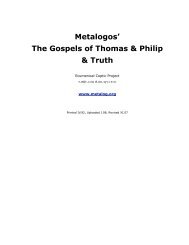Andrew Louth - Syriac Christian Church
Andrew Louth - Syriac Christian Church
Andrew Louth - Syriac Christian Church
You also want an ePaper? Increase the reach of your titles
YUMPU automatically turns print PDFs into web optimized ePapers that Google loves.
77A<br />
D<br />
B<br />
TEXTS 183<br />
quite other than our nature and completely foreign to it,<br />
indeed, utterly unknown: it existed with him from the<br />
beginning, and descending from above it came down with him,<br />
which is clearly what they think happened. 12 But why then did<br />
the descent to us take place? For we do not come close to him<br />
through his assumption of the holy flesh and hypostatic union<br />
with it, if it is not taken from us. The whole thing is an unreal<br />
delusion, a mere form deceiving the senses, and not the<br />
substance of flesh, nor the first-fruits of our race, unifying by<br />
grace the whole lump, 13 and dissolving all the divisions<br />
introduced by the transgression of the old Adam, through<br />
which nature has been condemned to death.<br />
Why do they begrudge us a perfect salvation and a perfect<br />
confession? Why do they direct against us syllogisms from<br />
which there is no escape, and assert that wills follow from<br />
energies, and that with this there follows contradiction, from<br />
which they introduce wills that conflict. Why should I omit to<br />
refute these charges? From where, and how, do they get these<br />
arguments? Why do they want to learn and enquire about only<br />
one thing, as if this were the only thing that mattered, and<br />
bring in the new Ecthesis, 14 imposing it involuntarily, and<br />
introducing force? Then, if they introduce the will after the<br />
action, since there was certainly no will before, where does it<br />
come from? And who is forced to have the will of the one who<br />
performed the action, so that what is done is done against his<br />
will, and acquiesced in contrary to his purpose? How again, if<br />
the Word made flesh does not himself will naturally as a<br />
human being and perform things in accordance with nature,<br />
how can he willingly undergo hunger and thirst, labour and<br />
weariness, sleep and all the rest? For the Word does not<br />
simply will and perform these things in accordance with the<br />
infinite nature beyond being that he has together with the<br />
Father and the Son, for as the divine teacher of Nyssa, the<br />
great Gregory, says, ‘with divine authority, he gives the nature<br />
time, when it wishes, to perform what belongs to itself.’ 15 For<br />
if it is only as God that he wills these things, and not as<br />
himself being a human being, then either the body has become<br />
divine by nature, or the Word has changed its nature and<br />
become flesh by loss of its own Godhead, or the flesh is not at<br />
all in itself endowed with a rational soul, but is in itself<br />
completely lifeless and irrational.<br />
If, then, [his humanity] has a rational soul, then it possesses<br />
the natural will. For everything that is rational by nature,<br />
certainly also possesses a will by nature. If then, as man, he




